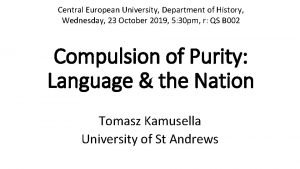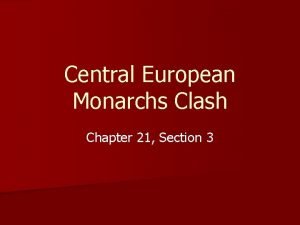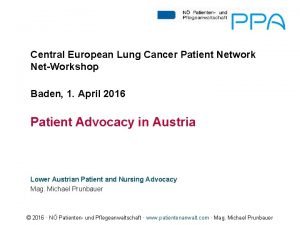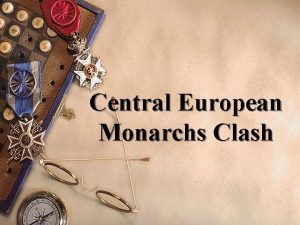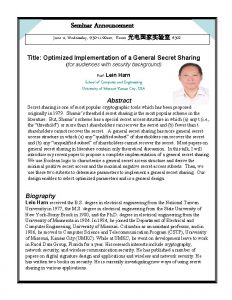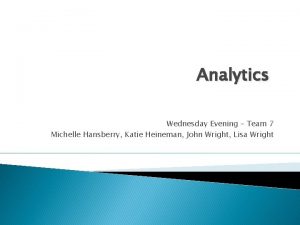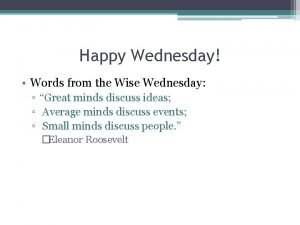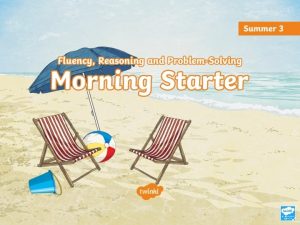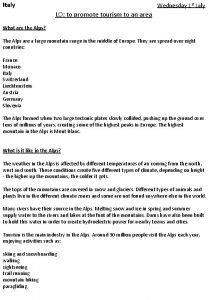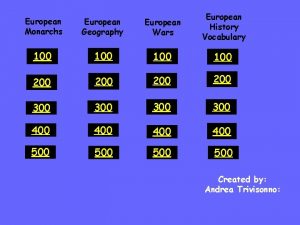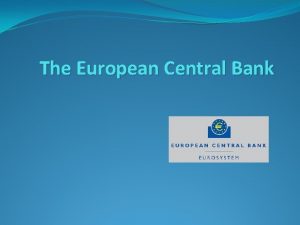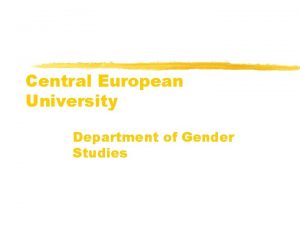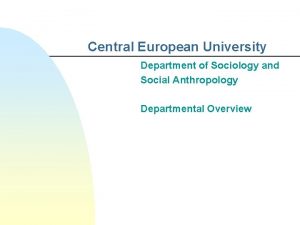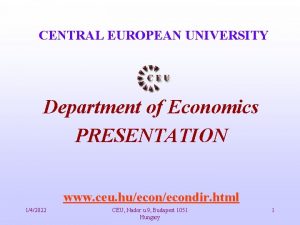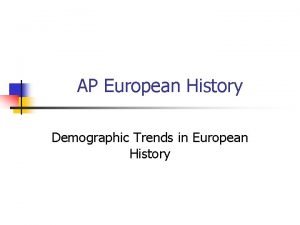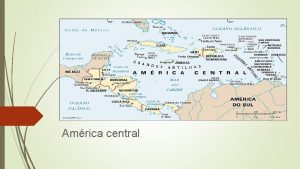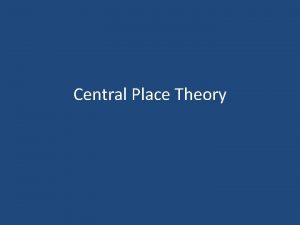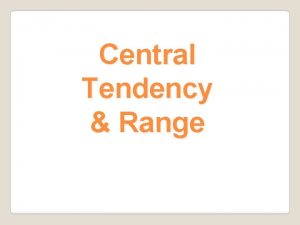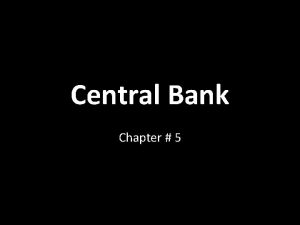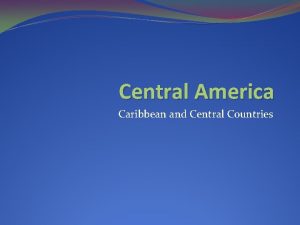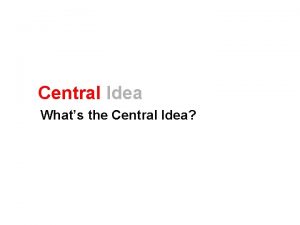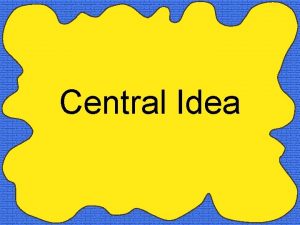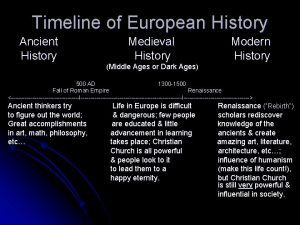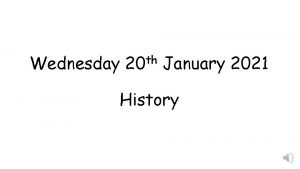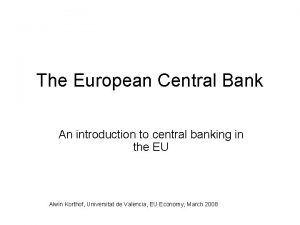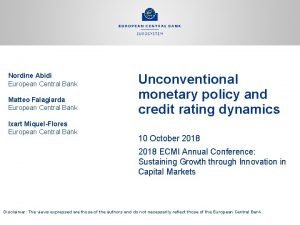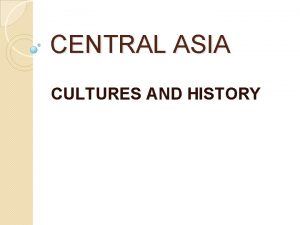Central European University Department of History Wednesday 23









































- Slides: 41

Central European University, Department of History, Wednesday, 23 October 2019, 5: 30 pm, r: QS B 002 Compulsion of Purity: Language & the Nation Tomasz Kamusella University of St Andrews

Political Concept of Purity: Religious Origins 1 Sp Limpieza de sangre / Pt limpeza de sangue, or ‘purity of blood’ In Spain/Portugal, and both countries’ world empires • Metaphor for the political and normative ideal of religious homogeneity in a polity ØExpulsions of Jews and Muslims from Iberia after 1492 ØRepeated expulsions of Conversos & Moriscos

Political Concept of Purity: Religious Origins 2 ‘Purity of blood’ as the yardstick for ranking the social pyramid in Spain/Portugal and the two countries’ empires: Ø ‘Old Christians’ on the top Ø ‘New Christians’ (the converted in Iberia) Ø Christianized indigenous populations in the colonies Ø ‘pagan’ indigenous populations at the bottom

Iberia: From ‘Pure Blood’ to Modernity • 1860 s: ending the legal test of the ‘purity of blood’ as an entry requirement for the army, civil service and higher education in Spain • Unofficial discrimination on this account continues in Spain for a century longer, until the 1960 s • Indigenous populations typically at the bottom of society in most Latin America’s nation-states

Western Europe: Religious ‘Purity’ • non tolerandis Judis ØDiscrimination & expulsions of Jews • Hussitism/Reformation & Counter-Reformation ØReligious wars, 15 th – 17 th centuries ØPolitical norm (‘Westphalian model’): Legitimate polity = religiously homogenous

Nationalism & Homogeneity (1) • French Revolution: From the Kingdom of France to the French nation-state (Republic) • From religious homogeneity to ‘civic purity’ • Declaration of the Rights of Man and of the Citizen (1789) ØAll men (males) in the polity are equal and construed as citizens ØSubjects of unequal estate statuses into equal citizens ØCitizens = Nation

Nationalism & Homogeneity (2) • Revolutionary & Napoleonic wars: spread of nationalism • Destruction of the Holy Roman Empire • Anti-French reaction & the dilemma of German nationalism ØNo ancien regime polity available to be transformed into a German nation-state

Nationalism & Homogeneity (3) • 1813 solution: Ernst Moritz Arndt ‘Was ist des Deutschen Vaterland‘ ØGermany = ‘As far as the German language clings’ ØFrom HRE’s estates religious heterogeneity to ethnolinguistic purity ØSpeakers of a Language = Nation-State

Ethnolinguistic Nationalism & Purity (1) • 1813 – 1848 revolutions: slogan ‘Our Nation-State X = As far as our Language X clings’ translated into central Europe’s languages employed in administration, education and publishing ØSpread of ethnolinguistic nationalism as the new norm of statehood creation, legitimation and maintenance ØFrom Scandinavia to the Balkans ØFrom Strasbourg to Kyiv

Ethnolinguistic Nationalism & Purity (2) • Italy (1861) and Germany (1871) founded as ethnolinguistic nation-states ØItalian dilemma: ‘We have made Italy. Now we must make Italians’ (Massimo d'Azeglio) Øc 3% Italy’s inhabitants spoke & wrote (pure) Italian: The nation-state must teach all its citizens this national language

Ethnolinguistic Nationalism & Purity (3) ØGerman dilemma (1): non-German-speakers (‘minorities’) in the German Empire > Germanization ØGerman dilemma (2): German-speakers outside Germany (ie in Austria-Hungary) > ? (later solution: Hitler’s Greater Germany) ØGerman dilemma (3): religious heterogeneity: Protestants / Catholics > Kulturkampf > acquaiesance in the late 1880 s

After 1918: Triumph of Ethnlgsc Nationalism (1) • After WWI non-national, multiethnic empires in central Europe replaced with ethnolinguistic nationstates > Language = State ØBelarus, Czechoslovakia, Estonia, Hungary, Latvia, Lithuania, Poland • Anomalies > Austria, Free City of Danzig • Non-national Soviet Union > the Revolutionary vs the National

After 1918: Triumph of Ethnlgsc Nationalism (2) • Achieving ethnolinguistic purity/homogeneity: ØPoland: Banning pre-1918 administrative/nat’l languages > German, Russian, Ukrainian ØNorway: 2 official languages (Bokmal & Nynorsk) = 2 equal varieties of the single nat’l lg of Norwegian ØNorwegian solution: Czechoslovakia = Czechoslovak lg, Yugoslavia = ‘Yugoslav’ (Serbocroatoslovenian) lg • Frustration in central Europe: Allies & League of Nations > minorities treaties system

Balkans: Natl’ism & Religious Homogeneity • NB: Nation-states created in the Balkans at the same time as in Latin America: Serbia (1804 -78), Greece (1821 -30), Romania (1859/66 -78), Montenegro (1878 -1908), Bulgaria (1878 -1908): Ø (ethno)religious homogeneity = discrimination & expulsions of ‘non-believers’: Jews, Muslims • Model > from Ottoman millets to Russia: Jewish Pale of Settlement (1794 -1915/7), Circassian Genocide (1864)

Balkans: Religious & Lgsc Homogeneity (1) • Initially language not important: Ø(Vernacular, standard) Serbian banned in Serbia until 1868: official state & church lg: Slavenoserbian (Church Slavonic + Serbian) ØGreece: (vernacular, standard) Greek (Demotic) banned until 1976: official state & church lg: Katherovousa (New Testament Greek + Demotic) • Model > Russia: The Russian lg = Church Slavonic + Muscovian (dialect of Moscow)

Balkans: Religious & Lgsc Homogeneity (2) • First genuine ethnlgsc nation-state in the Balkans > Albania: ØEthnolinguistically homogenous > Albanianspeakers ØReligiously heterogeneous > Catholics, Muslims, Orthodox Christians

Balkans: Religious & Lgsc Homogeneity (3) • Turkey: language over religion Ø Turkish nation = Turkish-speaking Muslims Ø but expulsions of non-Muslims Ø & forced assimilation of non-Turkish-speaking Muslims Ø However, giving up on ‘Arabia’ (Arabic-speaking Muslims), incl. Makkah (as if Italy gave up on Rome)

Balkans: Religious & Lgsc Homogeneity (4) • 20 th c: giving precedence to language over religion, esp. during and after the communist period ØC 1900: stable standards and state-wide use of vernacular Bulgarian and Serbian as nat’l languages in Bulgaria & Serbia, respectively ØPolyconfessional Kdm of Serbs, Croats & Slovenes (Yugoslavia) = Serbocroatoslovenian (‘Yugoslav’) language

Balkans: Religious & Lgsc Homogeneity (5) Ø 1990 s: breakup of Yugoslavia = breakup of Serbo-Croatian • Religion still trumps language in Greece: Ø 1976: Demotic (vernacular) Greek ØBut only Orthodox Christianity affords access to full-fledged citizenship, state offices & elections

Concept of ‘a Language’ (1) • Language (Sprache) = biological (evolutionary, natural) capacity for speech > socially and spatially continuous • Humans & their groups devise concepts for dividing up the natural continuous linguistic into man-made (artificial) discrete units

Concept of ‘a Language’ (2) • Writing employed formulating and implementing the Judeo-Graeco-Latin (western) concept of Einzelsprache (‘a language’)> ØWestern colonialism made the Einzelsprache into a basic unit of modernity, alongside ‘the nation’ and ‘nation-state, ’

Concept of ‘a Language’ (3) ØImposed on the rest of the world or adopted for the sake of modernization (=westernization) ØEntailing, the rejection, suppression and loss of non-western concepts of the linguistic and the political

Producing an Einzelsprache (1) • Selection of a ‘powerful’ language variety (capital’s dialect, elite’s sociolect) • Endowing it with a unique script (writing system) • Branding other language varieties as ‘barbaric’ (‘undeveloped, ’ ‘backward, ’ ‘good only for the kitchen’) • Extensive use of the Einzelsprache in administration and for text (‘book’) production

Producing an Einzelsprache (2) • Early modernity: The Reformation, Counter-Reformation & religious wars ØNon-vernacular Einzelsprache of a ‘holy book’ questioned & suppressed ØInstead, a vernacular Einzelsprache(n) proposed ØAnd codified by a translation of a ‘holy book’ ØWidespread use in administration, for original works, and mass publishing ØPrint capitalism (Anderson 1983) = unification / standardization (PURIFICATION) of an Einzelsprache to broaden the target market & maximize profit

Producing an Einzelsprache (3) • Formal standardization of an Einzelsprache: Østate-approved, state-sponsored, or widely accepted translation of a ‘holy book’ Østate-approved, state-sponsored, or widely accepted authoritative dictionary Østate-approved, state-sponsored, or widely accepted authoritative grammar Østate-approved, state-sponsored, or widely accepted canon of the best works ØAt times, an official academy of Arts (Sciences) to create, standardize & control an Einzelsprache

Enforcing an Einzelsprache (1) • Modern (absolutist) polity > one state = one religion (religious homogeneity) ØSingle official Einzelsprache of administration ØSingle (preferred) Einzelsprache = medium of education ØCompulsory elementary education for all ØBan on, marginalization of other (potential, fledgling) Einzelsprachen in the state

Enforcing an Einzelsprache (2) • Ethnolinguistic nation-state (or nat’l movement aspiring for such a nation-state) > Language = Nation = State • Nationalism in central Europe after 1918 – sole accepted ideology of statehood creation (destruction), legitimation and maintenance • (Nationalism after decolonization & the breakup of the SU – the globe’s sole infrastructural ideology of statehood creation (destruction), legitimation and maintenance)

Enforcing an Einzelsprache (3) • Proper ethnolinguistic nation-state: ØSingle nat’l (state, official) Einzelsprache ØNOT shared with any other polity or (stateless) nation

Enforcing an Einzelsprache (4) • Ethnolinguistic nation-state (or nat’l movement aspiring for such a nation-state): Ø State-approved dictionary, grammar, canon ØState-approved principles of writing ØState-approved principles of pronunciation * No full command of the Nat’l Einzelsprache = No access to positions in civil service, army, educational system etc

Lgsc Purism & Ethnlgsc Purity (1) • Lgsc purism = homogeneity, purity of a nat’l Einzelsprache ØDifferent definitions and goals, driven by a given ethnlgsc nationalism ØGerman purism – ‘purging’ (‘cleansing’) of ‘foreign’ (mainly, French) elements (words, phrases, spellings, syntax borrowings or similarities) ØFor limiting an overlap and creating a clear-cut ‘lgsc boundary’ in usage, space & social relations between the Einzelsprachen of German and French

Lgsc Purism & Ethnlgsc Purity (2) • For similar purposes, in the 2 nd half of the 19 th c Czech was ‘purged’ of ‘German elements, ’ • while in the 20 th c Slovak was imbued with ‘German elements’ in order to differentiate it vis-à-vis Czech, • or Polish was ‘cleansed’ of ‘ugly’ Germanisms and Russianisms

Lgsc Purism & Ethnlgsc Purity (3) • Purism, purging, cleansing an Einzelsprache of foreign elements ØCf metonymic similarity of vocabulary and overlap in methods with ethnlgsc nationalism ØDiscrimination, forced assimilation, ethnic cleansing, population transfer (xenophobia), genocide (Judenrein) targeting ‘foreigners, aliens, minorities’ (= ‘foreign elements, ’ ergo dehumanization)

Lgsc Purism & Ethnlgsc Purity (4) • 1990 s: Yugoslavia > (among others) Bosnia, Croatia, Montenegro, Serbia • 1991 -2007: Serbo-Croatian (Cyrillic & Latin alphabet) > ØBosnian (Latin alphabet), cleansed of Cyrillic & Serbianisms, enriched with Turkicisms to differentiate it from Croatian ØCroatian (Latin alphabet), cleansed of Cyrillic & Serbianisms, & Turkicisms ØMontenegrin, retained both alphabets and developed 2 specifically Montenegrin letters ØSerbian, officially (but not de facto) gave up on the Latin alphabet • Language engineering a metaphor for, ideological reflection of the acts of forced assimilation, ethnic cleansing and genocide in the course and wake of the wars of Yugoslav succession

Religion in Communist Central Europe (1) • Communism = BAN on religion (at least, in politics)? • Expulsions (‘exchanges’) of Turks/Muslims from communist Bulgaria & Yugoslavia to Turkey • Expulsions of Jews/Judaists from all around the Soviet bloc • NO Polish-speaking atheists (communists) of Jewish/Judaist origin exempted • OR Bulgarian-speaking atheists (communists) of Muslim origin with no command of Turkish exempted

Religion in Communist Central Europe (2) • Case of Communist Bulgaria: Ø 1960 s-1978: ending minority education in minority languages Ø 1970 s-1985: de facto liquidation of Muslim religious life Ø 1984 -5: Bulgarianization of Muslim, Turkish & Roma names; ban on the use of Romani & Turkish Ø 1985 census – no minorities, all Bulgarians = monolingual Bulgarian-speakers (unofficially/culturally Orthodox Christians)

Conclusion (1) • Homogeneity / Purity is in the Perceiver’s eye • It is a moving feast ØUpper Silesia ØDuring ancien regime (‘religious purity’), after the religious wars – homogenously Catholic ØWith the rise of ethnolinguistic nationalism (‘language = nation’) – linguistically heterogeneous ØErgo, expulsions & bans on languages necessary to achieve ethnolinguistic homogeneity

Conclusion (2) • In Europe (the west) the metaphor/ideal of ‘purity/homogeneity’ is just another name for what is accepted from the sociopolitical perspective ØFor instance, in Japan people are ‘homogenously’ bi- or even tri-confessional (Shinto & Buddhism; at times Christianity)

Conclusion (3) ØGermanophone Swiss are ‘homogenously’ bilingual (Hochdeutsch & Swiss German) or trilingual (usu. + French) ØThe Mauritians are ‘homogenously’ multiethnic, multicultural & multilingual

Conclusion (4) • All in all, it is humans and their groups who create, justify, maintain and decide about the social reality • The social reality is entirely DEPENDANT on human will • Unlike the material reality that is entirely INDEPENDENT of human will • Hence, humans can come up with whatever ideas they want • And implement them in all kinds of ways

Abstract Purity or, in other words, homogeneity is an early modern European (western) political idea(l), which says that a polity must be normatively homogenous in order to be legitimate. Initially, such political homogeneity was expressed and implemented in religious terms, before linguistic homogeneity became the new norm in the age of nationalism across central Europe. In the wake of decolonization and the breakup of the SU, this ideal spread all around the world as part and parcel of the now universally accepted model of statehood in the form of nation-state. However, definitions of homogeneity are context-dependent and hinge on frequently fickle political decisions. What was homogenous yesterday may appear heterogeneous today. In reality, the concept of ‘homogeneity/purity’ is another name for what is seen as politically appropriate and legitimate in a given place at a given time by a given group of people.

Dr Habil TOMASZ KAMUSELLA FRHist. S is Reader (Professor Extraordinarius) in Modern History at the University of St Andrews, Scotland, UK. He specializes in the interdisciplinary study of language politics and nationalism in modern central Europe. His recent English-language publications include the monographs Ethnic Cleansing During the Cold War: The Forgotten 1989 Expulsion of Turks from Communist Bulgaria (2018), The Un-Polish Poland, 1989 and the Illusion of Regained Historical Continuity (2017), and Creating Languages in Central Europe During the Last Millennium (2014). Lately, he also initiated and cooedited the following volumes, The Social and Political History of Southern Africa's Languages (2018), The Palgrave Handbook of Slavic Languages, Identities and Borders (2016), and Creating Nationality in Central Europe, 1880 -1950: Modernity, Violence and (Be) Longing in Upper Silesia (2016).
 European central university
European central university Hapsburg triumphs
Hapsburg triumphs Gesundheit central european lung cancer patient ne
Gesundheit central european lung cancer patient ne Infohub nspa
Infohub nspa Chapter 5 section 3 central european monarchs clash
Chapter 5 section 3 central european monarchs clash Central european monarchs clash
Central european monarchs clash Monday tuesday wednesday thursday friday calendar
Monday tuesday wednesday thursday friday calendar Wednesday evening prayer
Wednesday evening prayer Wednesday seminar
Wednesday seminar Ib boundaries 2019
Ib boundaries 2019 Web analytics wednesday
Web analytics wednesday Again
Again Good morning happy february
Good morning happy february Wednesday is my favorite day
Wednesday is my favorite day Skinny wednesday
Skinny wednesday Pat winlink
Pat winlink Thursday tuesday
Thursday tuesday Wise wednesday
Wise wednesday Happy wednesday march
Happy wednesday march Monday tuesday wednesday thursday friday saturday sunday
Monday tuesday wednesday thursday friday saturday sunday English class is wednesday
English class is wednesday Wednesday journal prompts
Wednesday journal prompts Wednesday bellwork
Wednesday bellwork Wednesday bellringer
Wednesday bellringer Marvelous monday terrific tuesday wonderful wednesday
Marvelous monday terrific tuesday wonderful wednesday Enum days sunday monday=5 tuesday=6 wednesday=7
Enum days sunday monday=5 tuesday=6 wednesday=7 Wednesday bellwork
Wednesday bellwork Wednesday good morning
Wednesday good morning Thursday prayer images
Thursday prayer images Wednesday bell ringer
Wednesday bell ringer Wednesday syllables
Wednesday syllables Borwick hall outdoor education centre
Borwick hall outdoor education centre Happy monday answer
Happy monday answer Happy wednesday
Happy wednesday Thursday prayer
Thursday prayer Fe exam results wednesday
Fe exam results wednesday Wednesday phonics
Wednesday phonics Sunday monday tuesday wednesday
Sunday monday tuesday wednesday 1
1 Monday=621 tuesday=732 wednesday=933
Monday=621 tuesday=732 wednesday=933 Wednesday lo
Wednesday lo Wednesday at 6
Wednesday at 6
